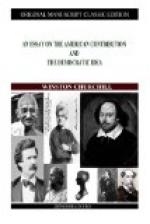In America we succeeded in eliminating hereditary power, in obtaining a large measure of political liberty, only to see the rise of an economic power, and the consequent loss of economic liberty. The industrial development of the United States was of course a necessary and desirable thing, but the economic doctrine which formed the basis of American institutions proved to be unsuited to industrialism, and introduced unforeseen evils that were a serious menace to the Republic. An individualistic economic philosophy worked admirably while there was ample land for the pioneer, equality of opportunity to satisfy the individual initiative of the enterprising. But what is known as industrialism brought in its train fear and favour, privilege and poverty, slums, disease, and municipal vice, fostered a too rapid immigration, established in America a tenant system alien to our traditions. The conditions which existed before the advent of industrialism are admirably pictured, for instance, in the autobiography of Mr. Charles Francis Adams, when he describes his native town of Quincy in the first half of the Nineteenth Century. In those early communities, poverty was negligible, there was no great contrast between rich and poor; the artisan, the farmer, the well-to-do merchant met on terms of mutual self-respect, as man to man; economic class consciousness was non-existent; education was so widespread that European travellers wonderingly commented on the fact that we had no “peasantry”; and with few exceptions every citizen owned a piece of land and a home. Property, a refuge a man may call his own, and on which he may express his individuality, is essential to happiness and self-respect. Today, less than two thirds of our farmers own their land, while vast numbers of our working men and women possess nothing but the labour of their hands. The designation of labour as “property” by our courts only served to tighten the bonds, by obstructing for a time the movement to decrease the tedious and debilitating hours of contact of the human organism with the machine,—a menace to the future of the race, especially in the case of women and children. If labour is “property,” wretches driven by economic necessity have indeed only the choice of a change of masters. In addition to the manual workers, an army of clerical workers of both sexes likewise became tenants, and dependents who knew not the satisfaction of a real home.




